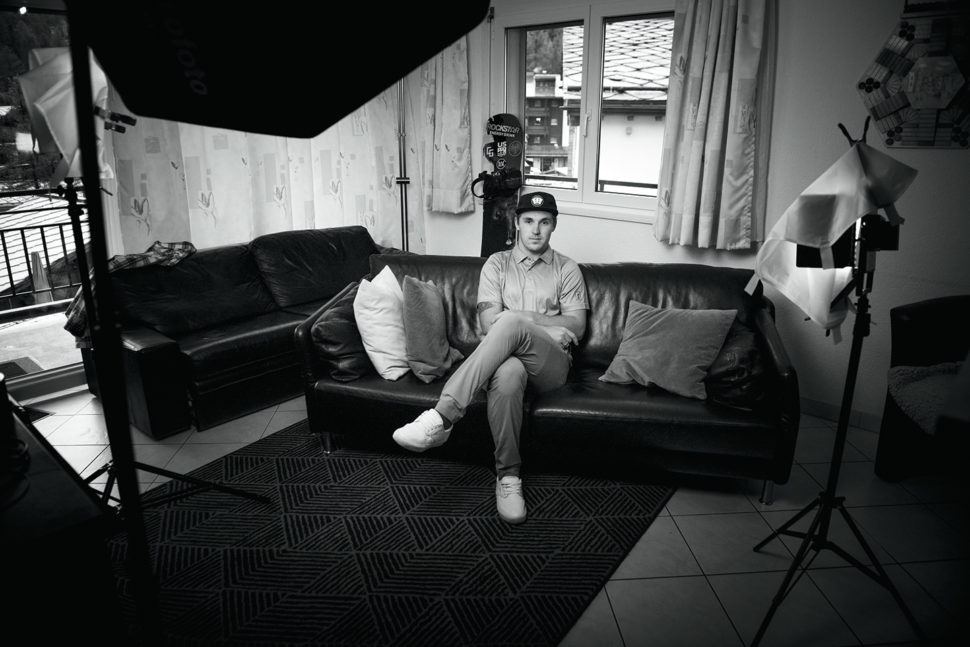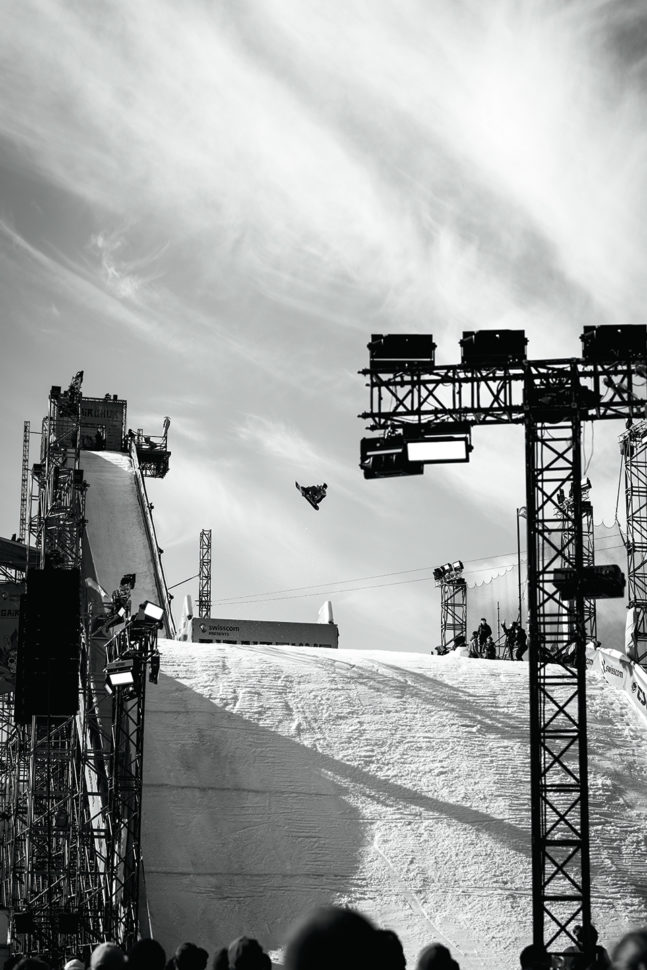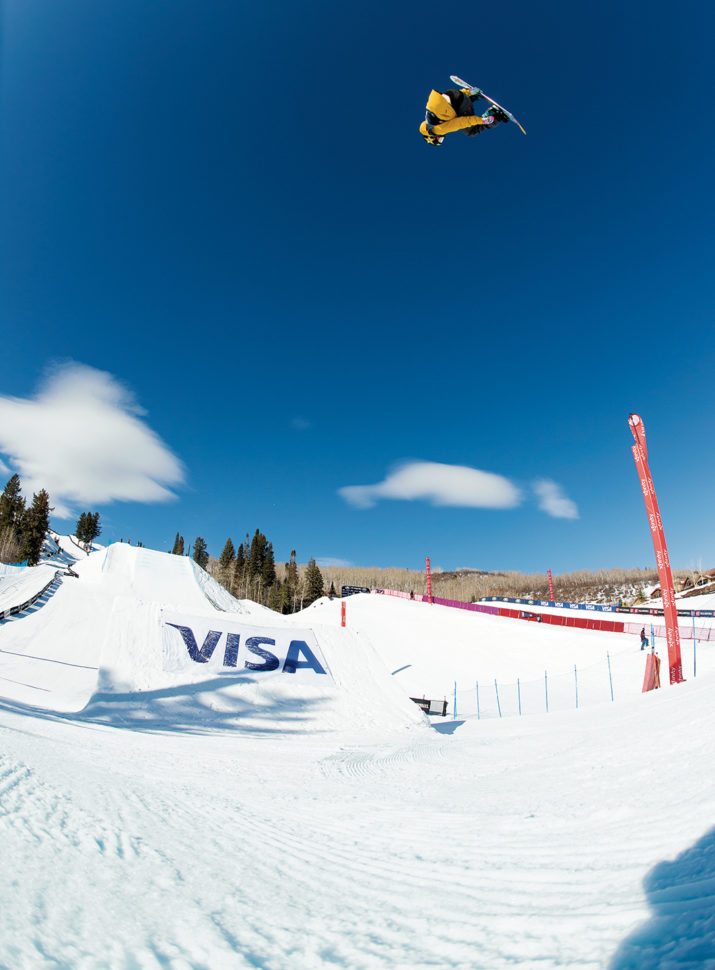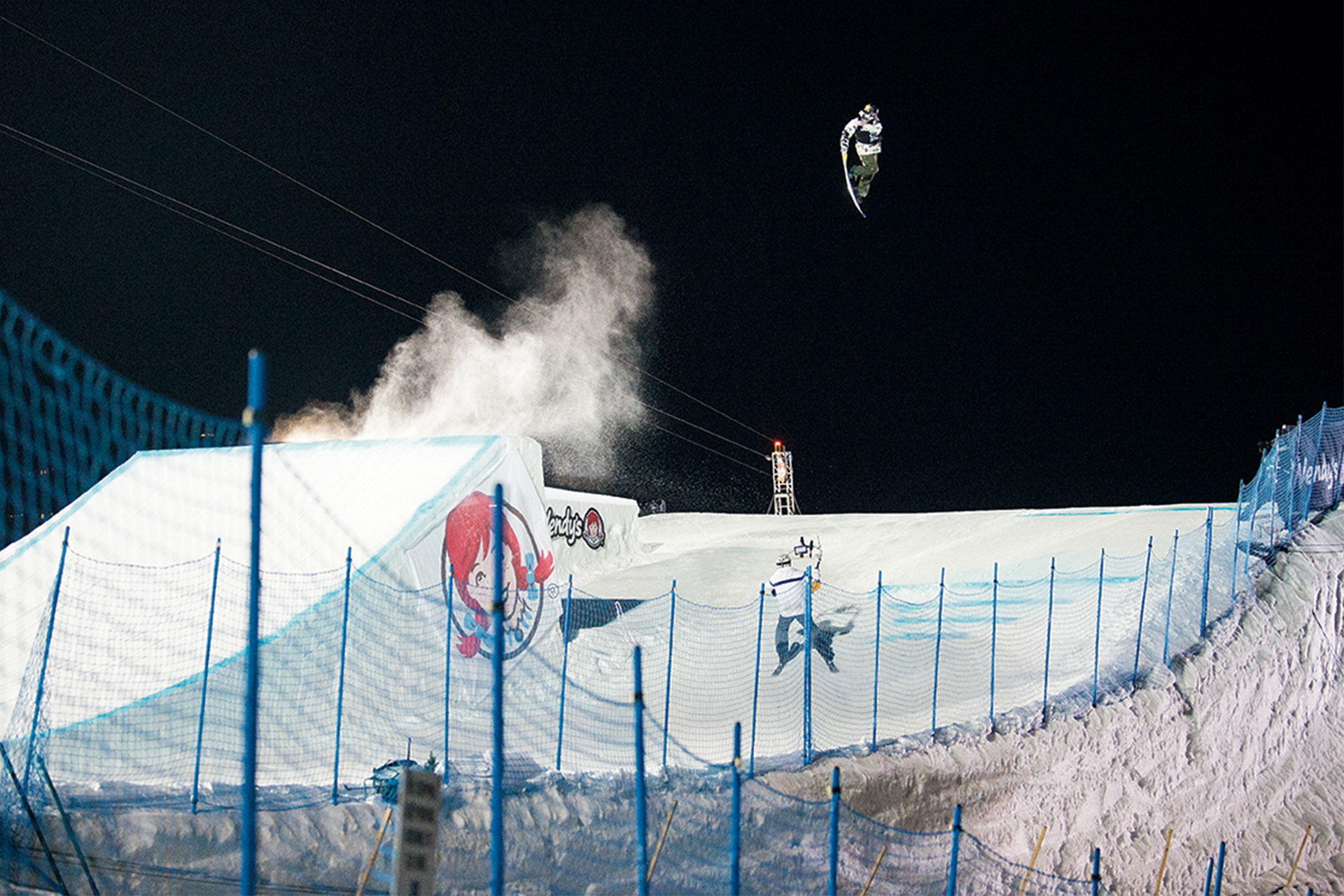Products You May Like
In a world where raw talent is just the entry fee, the code to the no-limit game of competitive snowboarding is more often cracked with determination and mental fortitude than some innate gift. Though talent might put the board under your feet, it is razor-sharp focus that keeps it there when the stakes are the highest. For Chis Corning, this has always been his ace in the hole.
As a young snowboarder in Colorado, Corning was not alone in his quest for glory. Take one look around the terrain parks of Summit County and the slopes are littered with kids doing what just ten years ago seemed comically impossible on a snowboard. Growing up in Denver however, the Never Summer rider wasn’t gifted anything in his rise to podiums around the world. Having to scratch tooth and nail with his dad by his side, Corning eventually learned the ins and outs of a sometimes-privileged scene, quickly realizing that above all else, it was his mental game that required mastery. And though his early contest results may not have been very foretelling, his lofty goals were. In short, Chris had a resolve unlike his contemporaries.
Chasing the contest circuit and rearranging his life to that of professional teen snowboarder eventually led to a fourth-place finish at the inaugural Big Air event at the 2018 Winter Olympics in Pyeongchang, South Korea. To much of the snowboard world, it seemed this kid came out of nowhere, edging out most of the big names riders and narrowly missing the podium at the world’s largest sporting event. Unlikely success for the then 18-year-old Colorado native, who just a few years before wasn’t even on the US Team’s radar. – Nate Deschenes

Start from the beginning, so we get a picture of what it takes to become an Olympian.
Well, it’s not that simple. I mean, I didn’t even start riding until I was seven. For me, it was just the fact that my dad loved to snowboard. I grew up in Denver and we rode Loveland religiously on the weekends. As I fell in love with it more and more, he made the same commitment as me. Eventually that turned into riding Echo Mountain on Wednesday and Friday nights.
Echo Mountain. That place was cool.
Yeah, that place was awesome. It was one chairlift and all family, just outside of Denver in Evergreen. The whole mountain was a park, essentially. It was only two runs, but I know they stretched their resources to make this incredible park for us. Each year, as the snowboarding progressed, so did their features. I pretty much owe my career to getting started at Echo.
Is that where you began competing?
Yeah, a few amateur contests here and there, just little rail jams. We were just weekend warriors, so being able to ride there at night really allowed me to progress and get better very quickly. Just getting some laps in was everything. These days, a lot of kids have their coach at the age of 7, and that definitely was not me. I was super late into the game as far as that goes. I didn’t really start competing seriously until I was a teenager and all I had was my dad to push me along. We just winged it for a long time.
Was there any experience in those years that gave you the confidence to really go for it?
I didn’t do super well at those early contests, but I learned a lot. And I remember not doing so well at the USASAs one year really lit something in me. I was so bummed that I told my dad, I’m going to win every contest I do next year.” And it’s funny because that’s what I did. I stepped up and took every rail jam, every local contest, and then won the USASA Nationals at the age of 13, probably just because I told my dad I would do it.
Those are big goals for a kid. Did the experience of setting your mind on something and set-ting goals change you?
Without me knowing it, maybe. But when I was 15, I won my first World Cup in New Zealand after placing like thirtieth the year before. I beat out Yuki Kadono and Mikey Ciccarelli in that contest and after that, I really started to believe I could do something. I didn’t grow up in that scene and didn’t really understand it. It was just me and my dad trying to figure it out, so I wasn’t aware of all the tools you really needed to win at these higher-level comps. But now I had caught a glimpse and I began to take it super seriously from that point on.
Well, it seems if at such a young age you are already putting it in your head that you want to be the best, you must have had an understanding how to mentally set yourself up to succeed in the contest world.
I was so young that I didn’t really understand that part of it, but now I one hundred percent know that the mental game of competitive snowboarding is by far the biggest part of it. It’s something I work with on a daily basis and something that’s always giving me new insights. It’s cool because it’s not just snowboarding, it’s everything in life you want to accomplish.
Is it as simple as just telling yourself you’re going to win?
Well, that’s the end goal, but you have to break it down a little, otherwise it’s a bit overwhelming. So, I might have this mindset of, “I’m going out to win,” but it starts with, “Okay, I just want to make finals,” and my results would follow that. Then I started to say, “I want to podium at every event,” and sure enough, the results started to follow. So, I’ve come to understand how that works a little.
Are there any special tricks you have beyond just setting goals? How do you approach things?
Long story short, at this level, there is just a ton of routine that goes into every day and goes into every run. There’s endless visualization, there are special breathing techniques, there’s the imagination, and of course, hours of actual practice. I really think critically on certain things in an effort to make them habitual. These routines become habits and when something is a habit, it comes without much effort—you just do it. Your body and mind have done it so many times that it becomes second nature.

I imagine a million things could be running through your head before a contest.
I’ve learned to focus on my breath and that helps so much. I mean it’s damn near impossible not to think, right?! And usually, we are thinking about a million different things at any given point and that’s not really the state of mind you want to be in before something so consequential. So if I focus on my breathing, then I have narrowed down those million things to just one thing. In turn, that gives me the focus to remain balanced and calm throughout the process.
That’s some Jedi stuff right there.
Yeah, really! It’s crazy how many thoughts we must have a minute. It fascinates me to know that through some super simple techniques we can begin to control our thoughts. And that goes way beyond snowboarding, obviously.
These aren’t things we normally learn on our own. What would you attribute this knowledge to?
There was a specific time when competitive snowboarding just got too technical and I couldn’t figure out how to move on. Luckily, I met some coaches who really helped immensely. I kind of hit a wall and didn’t know how to progress to do these tricks that just looked impossible. Once I got some coaching, things sped up rapidly. I went from having 720s to having triple corks in the matter of a couple years. All of a sudden, I went from an amateur kid who did all right at contests to being able to compete and win World Cups. It was a crazy time.
That’s when things took off for you, right?
I remember talking with a coach in Aspen when I was fourteen and we were looking at this eight-year plan. It was going to be four years until the Olympics and we were strategizing that after those Olympics, I would really be ready to have a go at that level possibly for 2022. The 2018 Olympics weren’t even on my radar at that time because it seemed like a world away. But instead, because of some incredible coaching, I made the US Snowboards Team at age 16 and qualified for the Olympics two years later. So, meeting the right people and using the right strategies, I fast-tracked that eight year plan to four.
My coach now always likes to remind me of when I got off the bus with Red Gerard at the Olympics in 2018. He said we both had this look of complete disbelief. And it’s true, we literally could not believe we were there. To be 17 and 18 years old with the best riders in the world on that stage, what?! It was crazy.
So, what’s the key to progression in your mind?
Well, on our level it’s different and the coaching is pretty essential, but it’s pretty simple: Don’t forget to have fun and try and ride with people better than you. The first double cork I ever did wasn’t because of a coach, it was because I was with my buddy who had done them before. He walked me through it and got me excited to try one.
Also, never discount the mental side of things. The body and brain are an amazing thing when they work together, but you kind of have to trick your brain sometimes. Say if I have a big problem at school, it may seem huge, and maybe it is, but you start just one paragraph at a time and figure it out section by section, piece by piece. Then the bigger goals become manageable. It’s the same way with snowboarding. You’re not going to just learn a triple cork. You have to learn a backside 180, then a 360 and so on. It’s amazing how fast that huge goal becomes reality. I’d say don’t really look to your physical ability as much as where your mind is at. Your practice and determination will provide progression beyond what you even dream sometimes.
So, let’s go back to the Olympics. How was that experience?
Crazy for sure. I didn’t know what to expect and it was much different than I thought, to be honest. In any other contest scenario, you show up and do your thing and then you are free to kind of live your life, go where you want, hang out with who you want—just normal stuff you don’t think about. At the Olympics, you are literally stuck in camp USA in the Olympic Village. You can’t go visit your friends from Canada or whatever. You just can’t do anything! I mean you have all the other Olympians, but it was kind of tough to just be in your room the whole time. I guess I wasn’t expecting that part or it.

Was that difficult to navigate mentally?
Well, it might sound funny to say, but I was only 18 during that experience. Yeah, I’m only 22 now, but I feel I have changed so much in these past four years. So as far as my mental thing goes, I was not in the same place I am now. So, being in that situation for the biggest contest of my life affected me. I was a bit thrown off.
But in end, you got forth? That’s pretty unreal.
Yeah, I got fourth, but my heart was broken. It was a sad time for me because I was just so close to being on the podium at the biggest sports event in the world. My entire life had led me to that moment and I just felt so disappointed. I was so caught up in the fact that this was the biggest contest in the world and that I had to do well, that I totally missed on the pure enjoyment of even being there. Part of it was lost on me because I was so distracted by this idea I had constructed. It goes back to the balance I talked about before, where if there’s too much going on in your head, then you are not in the mental state that’s going to allow you to flow and be one with the experience. I learned a valuable lesson after that and that is to try and compete without emotion. If I’m competing so emotionally, I’ve found that I’m not all there, and I need to be all there if I’m to do my best. Looking back, yeah, I am proud of it, but at the time I was pretty distressed, you might say.
How are you preparing for the upcoming Olympics?
Now that I know what to expect, I think I will be better prepared and more relaxed. It’s honestly not going to be so different than things have been. Tons of things have changed in my life since Pyeonchang, so I’m just using these years of maturing to be ready to try and make the team again.
And this time around, what are your goals?
To be on the podium, of course, but in the end, if I do the best I can do then I’m happy. If the judges like what I do, then great. If they don’t, well that’s fine too. I can’t really allow the things beyond my control to affect me too much. I spent a lot of time over the years being discouraged by low scores and trying to live up to certain things, but what I’ve learned is that if I do my best, then I’m totally good with that. You can’t let other people’s opinions or expectations affect your well-being. If I spent my whole life wondering what people think about me, I would be miserable.
What happened in Saas-Fee this fall?
Some crazy stuff, for sure. People were throwing down. There was good weather and the jump was perfect; it offered quite a bit of opportunity for progression, which was pretty awesome. I had never hit a jump like that—you didn’t get a whole lot of G’s on it. The take-off was nice and smooth, the landing was long, and it was a pretty large gap. At most of our contests we never have a gap that big, so that allowed people to be able to do tricks that they’ve never done before or that have never been landed in history. It was pretty cool to be there and watch it all, and to hit that jump and progress, too.
Did you try any eighteens or anything bigger than you’ve gone before while you were there?
No, I did not. I did some cab sixteens, but I’ve done those before. I was trying to just get them solid because I’ve only done them at X Games on the big air jump; I have never done them on a jump that is somewhat normal size. Basically, I was working on all four sixteens for slope, so nothing to the height of what a few people were doing. Those guys were throwing down.
Sixteens are insane in themselves. Going into this season, the progression just keeps pushing. Being an Olympic year, what do you think is going to happen?
I think it’s one thing to land these spins and then put them into a contest and it’s another thing to be able to do it consistently. The power of a contest is pretty cool; it gets you going. You always see people doing stuff for their first time at big contests. So that’s pretty awesome. But with how FIS does their stuff, you have to be real consistent and be able to put down the stuff that you’ve been learning, so it’ll be interesting. It’s just like what happened at the big air contest recently in Chur. No one landed an eighteen or anything in practice because the jump was difficult. The jump in Saas-Fee was perfect. It’s pretty tough to learn something on a perfect jump and then take it to a jump that’s not perfect.
So you’re not expecting to see 1800’s at every single contest this year.
No. Especially because of jump size. You need a large jump to be able to land that stuff. There are definitely going to be contests where they have the right jump. But are the 1800’s going to be consistent? More consistent than it’s ever been, for sure, but we’ve been doing eighteens at contests for years now. I think I did one of my first ones four years ago. So, we’ve been doing them, just more people are getting them. It’s like what happened with doubles and what happened with triples.
Are you ever scared when you’re spinning that much?
Yeah. The short answer is it’s terrifying every single time you even think about it. It’s really, really scary. The crazy thing to think about is that there are a lot of people that have the ability to do a trick like that, but that’s what makes people professional in whatever their sport is because they’re good at putting away the pressure and just doing what they need to do. It is that idea.

Follow-up question: so then why do you do it?
Because I want to win. Fortunately or unfortunately, depending on your view of snowboarding, as much as people say it’s the riders that push the sport, it’s not. It’s the judges who are judging you. If somebody does an extra 180, they’re getting more points. If somebody doesn’t do that, then other people are going to do what it takes to win. So like I said, depending on what you think about the sport and where it should be going, it’s either good or bad. But that’s what’s happening. Riders are rewarded by the judges if they add an extra 180. They want to see you do that. They want to see you push that aspect of the sport. And the dial is a little bit less than that. There are differences, of course, when people add in different grabs or different style into different spins; some people can do fourteens and they can score almost as high as somebody that does do a sixteen, but if you do more spins, then you have a really good chance of getting a higher score.
What do you say when people critique the spin-to-win mentality?
I would just say, in what other sport or profession does somebody not do what it takes to win? None. So why would you expect snowboarding to not do the same? That’s what it takes. In a professional sport, you have to push the limits, and what those limits are haven’t necessarily been met yet. It’s a personal preference and there are different types of snowboarding. If there is that part of you that doesn’t like the spin-to-win aspect, there are other things in snowboarding that you can do. Honestly, that’s one of the toughest parts about snowboarding, the fact that people can’t comprehend what we’re doing, whereas in other sports, you go pick up a ball, you can start playing, and you can understand how hard it is. It’s hard to realize the technical stuff that goes into doing fourteens, sixteens, eighteens, whatever it is. The amount of thought and things that go into it and what preparation that it takes to be able to do something like that is an insane level.
We’ve talked about all these technical aspects of the sport, but there’s a whole other side of snowboarding that takes inspiration from others. What do you take away from getting to compete against the best snowboarders in the world?
I was just watching everyone ride the other day and I was like, “Man, everyone is ripping!” I’ll never get tired of that. I take such inspiration from watching other people do their thing. Whether it’s a technical style or a smooth style or it could be a maniac style, it doesn’t matter—when you see people doing what they love to the best of their ability and with every ounce of energy in their bones, you just can’t help but feel good. Whether it’s a single pow turn or an 1800, it’s all the same to me if it’s done from the heart and with all you have. You do what you like and he does what he likes. It’s just an expansion of yourself and that’s what snowboarding is all about.
What kind of riding do you do when you have free time?
Well, to be honest, I’d say I get about ten days of riding of what I would qualify as my best days of just going out there, having the most fun I can. Snowboarding is fun, so it’s pretty hard to say that it’s just all work, but there are definitely times that it feels like work. So I would have to say it’s probably 80/20. 80 just out there grinding and the rest of the time I’m just hanging out and having fun, not thinking about trying to get better. Honestly, the most fun for me is just going out with my friends I’ve had forever and chucking our meat on some small jumps into powder. A 20-foot jump with friends beats anything for me. To show them some little things I’ve learned is really fulfilling and to see them learning and laughing is really special. I’m able to take my fiancé out with me, too. She’s only been riding two years and has fun and gets after it all the same. Ultimately there’s a sense of pure joy in the simple act of snowboarding with your friends that you just don’t get anywhere else.
